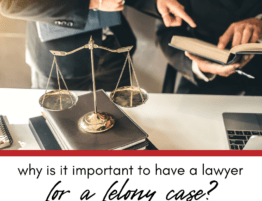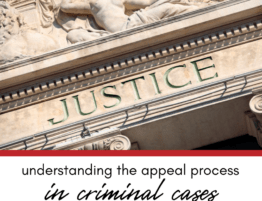
A felony conviction in Chicago carries serious consequences that can affect your life in multiple ways. Understanding the ramifications of such a conviction is essential in making informed decisions and taking the necessary steps to protect your rights. This guide delves into the consequences of a felony conviction in Chicago and provides valuable insights to help you navigate this complex situation.
The Consequences of a Felony Conviction in Chicago
This guide explains the following:
- Legal Consequences of a Felony Conviction
- Employment Challenges After a Felony Conviction
- Housing Difficulties Following a Felony Conviction
- Loss of Civil Rights
Rebuilding Your Life After a Felony Conviction
Here’s a closer look at each.
Legal Consequences of a Felony Conviction
A felony conviction in Chicago typically results in substantial fines, lengthy prison sentences, and probation. The severity of these penalties depends on the nature of the crime and any prior criminal history. Additionally, you may face court-ordered requirements, such as drug or alcohol rehabilitation, community service, or anger management classes. It’s important to note that felony convictions can also affect future legal proceedings, such as child custody or divorce cases.
Related: What happens if you get a DUI in Illinois when you’re under 21?
Employment Challenges After a Felony Conviction
Finding and maintaining employment after a felony conviction can be challenging. Many employers conduct background checks, and a felony record may disqualify you from certain jobs, especially those involving public trust, finance, or working with vulnerable populations. You might also face difficulties obtaining professional licenses or certifications. It’s essential to be honest about your criminal history during the job search process and focus on developing skills that make you more marketable.
Related: Illinois DUI defense information
Housing Difficulties Following a Felony Conviction
Securing housing after a felony conviction can be an uphill battle. Landlords often run background checks on potential tenants, and a criminal record may lead to a denied rental application. Public housing authorities may also impose restrictions on individuals with felony convictions, particularly for drug-related offenses or crimes involving violence. To increase your chances of finding suitable housing, consider working with a reentry program or seeking the help of a supportive network.
Loss of Civil Rights
A felony conviction in Chicago can lead to the loss of certain civil rights. You may lose the right to vote while incarcerated or on parole, depending on the type of felony. Additionally, you may be prohibited from owning or possessing firearms, serving on a jury, or holding public office. It’s important to understand these limitations to avoid further legal trouble.
Related: 5 things cops look for to pull you over for DUI
Rebuilding Your Life After a Felony Conviction
Despite the challenges that come with a felony conviction, rebuilding your life is possible. Utilize available resources, such as reentry programs, educational opportunities, and support groups, to help you reintegrate into society. Surround yourself with positive influences and remain committed to making constructive choices. Expungement or sealing your criminal record may also be an option in certain cases, which could make it easier to secure employment and housing.
The consequences of a felony conviction in Chicago are far-reaching and can impact many aspects of your life. By understanding these consequences and taking advantage of available resources, you can begin the process of rebuilding your life and working toward a brighter future.
Do You Need to Talk to an Attorney?
If you’ve been accused of a crime, we may be able to help you – and don’t worry: It’s completely confidential. Call us at 847-920-4540 or fill out the form below to schedule your free, private consultation with an experienced and skilled Chicago criminal defense attorney now.
Contact Us
"*" indicates required fields









